Notes on a California Sea Change
Watching the couples in line for licenses in Beverly Hills on the first day of gay marriage in California, I was struck by how the scene was so commonplace, even boring -- just a bunch of men and women waiting their turn at a nondescript government office.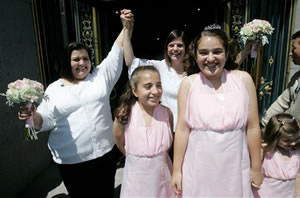
Watching the couples in line for licenses in Beverly Hills on the first day of gay marriage in California, I was struck by how the scene was so commonplace, even boring — just a bunch of men and women waiting their turn at a nondescript government office.
It was another of the events of 2008 that could scarcely have been imagined a decade ago, coming after an African-American secured enough delegates to win the Democratic presidential nomination and a woman came close to claiming it.
I have seen social change take place over many years. I’ve been a reporter amid violence, anger, injury, even death. Here history was being made by happy, calm men and women wearing khakis, polo shirts, Bermuda shorts, none of them making the fashion statements touted by the city’s outrageously expensive shops. I asked a man with a baseball hat and a big gut waiting in line with another man how he felt about the day. “Wow!” he said.
In May, the California Supreme Court struck down the state’s ban against same-sex marriage, which had been approved by 61 percent of the voters in 2000, and this was the first day marriages were performed under the decision, although a few places had permitted the ceremonies the evening before. Whether the decision stands will be decided by Californians on Nov. 5, when they vote on a proposed constitutional amendment prohibiting same-sex marriages.
The Supreme Court decision was not some wild thing coming out of the farthest left part of the left coast. Rather, it was written by a man anchored firmly in the mainstream, California Chief Justice Ronald W. George, a moderate Republican appointed to the high court by another moderate Republican, then-Gov. Pete Wilson. George is not afraid of controversy. In 1991, he wrote the high court ruling overturning a state law requiring minors to obtain parental consent before having an abortion. But mostly he is known as a cautious judge who would rather decide cases narrowly, and who devotes a huge amount of time to improving the administration of the state’s court system.
In striking down the 2000 state voter initiative that limited marriage to a man and a woman, Justice George said: “Marriage properly must be understood to encompass the core set of basic substantive legal rights and attributes … so integral to an individual’s liberty and personal autonomy that they may not be eliminated or abrogated by the Legislature or by the electorate through the statutory initiative process. … ” He also wrote, ” … An individual’s sexual orientation — like a person’s race or gender — does not constitute a legitimate basis upon which to deny or withhold legal rights.”
Since the 2000 passage of that ban on same-sex marriage, sentiments have changed. A recent Field Poll showed Californians supporting same-sex marriage by a margin of 51 to 42 percent. It was the first time in 30 years of polling on the subject that the Field Poll reported approval of such unions. A Los Angeles Times poll showed that 52 percent of those surveyed opposed the court striking down the ban and 54 percent supported the proposed constitutional amendment that would reverse the high court. This was much closer than the 2000 vote, which means Chief Justice George was not far from the mainstream in writing his opinion.
Both sides expect a close campaign over the proposed constitutional amendment that would wipe out the California Supreme Court decision. “I believe it will pass,” Michelle Hayton, spokesperson for the California branch of Concerned Women of America, supporting the ballot measure, told me. But she added, “It will be a pretty slim margin.”
David Mixner, a well-known gay political consultant and activist, expects a tight race but he believes voters will be reluctant to nullify marriages that have already been performed. “I think we really have a chance of winning,” he said.
A big question is how this emotional issue might impact the presidential campaign.
The Pew Forum on Religious and Public life noted that neither Sen. Barack Obama nor Sen. John McCain favors same-sex marriage. McCain says marriage should be between a man and a woman and should be regulated by the states. He endorsed a 2006 Arizona ballot initiative to limit marriages to those between a man and a woman, which was defeated. Obama says he personally believes that “marriage is between a man and a woman” but also says that “equality is a moral imperative” for gay and lesbian Americans.
In California, Obama is heavily favored to carry the state no matter how it votes on gay marriage. But the same-sex marriage issue could have a heavy impact in the battleground state of Florida, where a proposed constitutional amendment to ban such marriages is on the November ballot. Unlike California, Florida requires a 60 percent majority for passage, and current polls show it just short of that. A similar measure on the Ohio ballot in 2004 brought a huge turnout of conservative Christian voters and helped deliver the state to President George W. Bush, who, unlike McCain, favors a U.S. constitutional amendment limiting marriage to men and women. In a close contest, the issue could tilt Florida to McCain if the amendment fight draws a big conservative turnout.
The impact of the issue goes beyond the California and Florida contests. Like the Obama and Hillary Clinton presidential campaigns, the same-sex marriage elections — the way they are fought and how they are covered by the news media — will reveal how deeply we as a nation are coming to terms with a society that is increasingly diverse.
Hopefully, the peaceful scene at the Beverly Hills courthouse heralded another milestone: society’s acceptance of the right of gays and lesbians to marry, for better or for worse.
Your support matters…Independent journalism is under threat and overshadowed by heavily funded mainstream media.
You can help level the playing field. Become a member.
Your tax-deductible contribution keeps us digging beneath the headlines to give you thought-provoking, investigative reporting and analysis that unearths what's really happening- without compromise.
Give today to support our courageous, independent journalists.
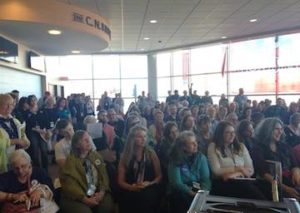
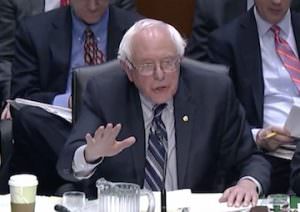

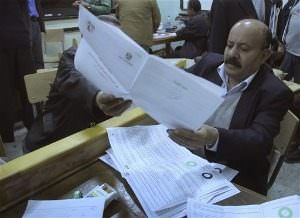
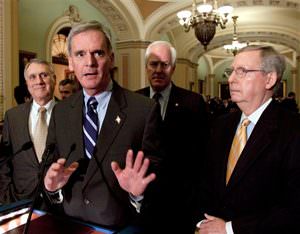
You need to be a supporter to comment.
There are currently no responses to this article.
Be the first to respond.